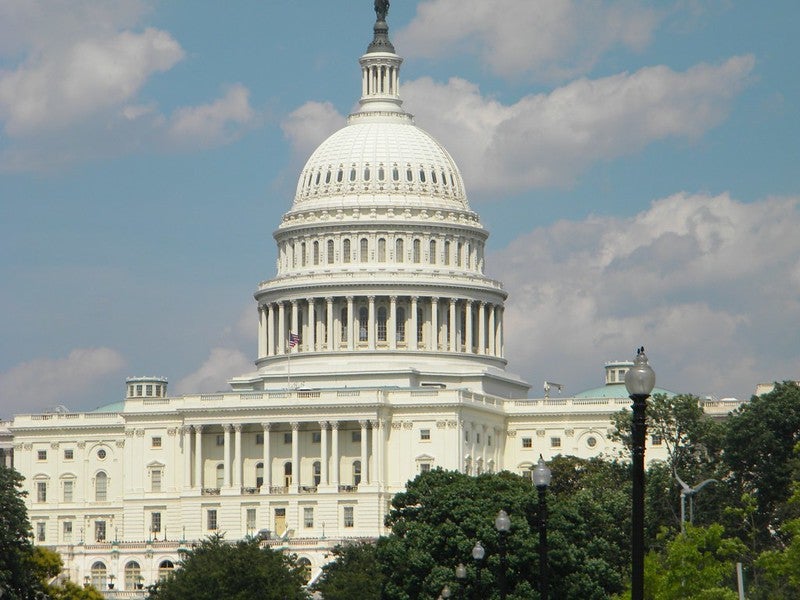
The energy and natural resources sector is one of the most influential in the US, exerting its influence on decision-makers at every level, including at the White House, Congress and the Department of Energy (DoE).
According to data coming from the US Centre for Responsive Politics, the energy industry occupies the ninth position for the amount of money spent on lobbying.

Discover B2B Marketing That Performs
Combine business intelligence and editorial excellence to reach engaged professionals across 36 leading media platforms.
The centre – which tracks money flows and lobbying in politics and its effect on elections and public policy – showed that the energy and natural resources industry spent $70.1m on lobbying politicians during the 2019 to 2020 election cycle.
Energy companies donated $49.7m to parties and candidates, giving 76.6% to the Republican party and its candidates while spending 23.3% on the Democrats.
Electricity cooperatives such as The National Rural Electric Cooperative Association and multinational energy providers, including Exelon, were among the top five contributors during the current election cycle.
Top recipients include White House Democratic candidate Bernie Sanders as well as Republican senators and congressmen.

US Tariffs are shifting - will you react or anticipate?
Don’t let policy changes catch you off guard. Stay proactive with real-time data and expert analysis.
By GlobalDataThe power lobby not only influences election cycles but also impacts everyday public policy, campaigning to different governmental agencies and for bills to pass.
Power Technology takes a look at the top five electric utilities by money spent lobbying in 2019.
Southern Company
In 2019, Southern Company, the second-largest utility in the US in terms of customer numbers, spent $12.2m lobbying government organisations, including the Environmental Protection Agency (EPA), the White House and the DoE.
The Atlanta-based utility provider lobbied for 19 bills to be passed by US Congress and Senate, including the Nuclear Energy Leadership Act and the Enhancing Fossil Fuel Energy Carbon Act 2019.
The Nuclear Energy Leadership Act – introduced in June 2019 and currently being reviewed by the energy subcommittee – aims to advance nuclear goals, including establishing a long-term power purchase agreement (PPA) from a commercial nuclear reactor by the end of 2023.
The 2019 Enhancing Fossil Fuel Energy Carbon Act was introduced to amend the 2005 Energy Policy Act to enhance fossil-fuel technology, by investing $5.4bn between 2020 and 2024.
The Energy Policy Act authorised loans for companies that used technologies to cut down on their greenhouse emissions as well as increasing the amount of biofuel that must be mixed with gasoline.
Edison Electric Institute
The institute, representing “all US investor-owned electric companies”, invested $8.9m lobbying agencies such as the Department of Homeland Security and the Treasury.
The institute, which provides electricity to 220 million US citizens, lobbied for 89 bills in 2019.
The Climate Action Now Act was passed by Congress and is currently under the Senate’s scrutiny. The bill urges President Trump to develop a plan for the US to meet its climate targets, as determined by the Paris Agreement.
Through the Better Energy Storage Technology Act, the organisation also lobbied for the DoE to develop a research and development programme for grid-scale energy storage.
American Electric Power
American Electric Power’s total lobbying expenditures amounted to $8.4m, with the EPA being the only agency the utility lobbied to.
Out of 22 bills, the company lobbied for the Renewable Energy Transferability Act – which aims to give tax credits for renewable energy to be transferred to project partners – and the 2019 Clean Energy Production Parity Act.
The 2019 law aims at making fuel cell power plants that use electromechanical processes and linear generator assemblies eligible for credit.
Exelon
Exelon lobbied both the White House and the US Vice-President’s office as well as for 89 bills, spending a total of $5.9m.
The bills include the 2019 Nuclear Powers America Act and the Energy Innovation and Carbon Dividend Act.
The former aims to introduce tax credits for investments in nuclear energy plants while the latter is trying to impose a fee on the carbon content of fuels.
Energy Capital Partners
With $5.8m invested in lobbying activities, the New York-based private equity lobbied for offshore wind and natural gas projects. The Offshore Wind Incentives for New Development Act’s object is to give tax credits to offshore projects by 2026.
The equity relies heavily on renewables, with nine out of nine investments in renewable companies and projects.
Energy Capital Partners also campaigned for the 2019 Launching Energy Advancement and Development through Innovations for Natural Gas Act.
The proposal will instruct the DoE to develop a programme for the capture of CO2 from facilities that generate natural gas.
The DoE will foster the development of technologies that capture greenhouse emissions and will enter into agreements to establish at least three carbon capture facilities.





